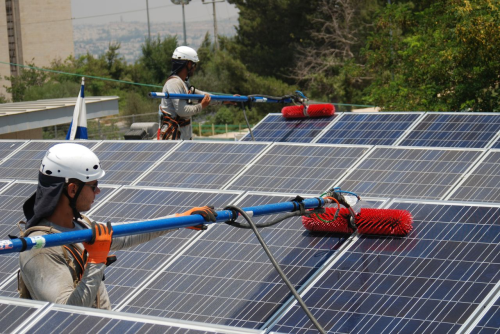During high temperatures in summer, solar panels can be exposed to extreme heat, which may affect their efficiency and longevity. To ensure optimal performance and protect your solar panels during hot weather, consider taking the following precautions.
- Regular Cleaning and Maintenance
Dust, dirt, and debris can accumulate on solar panels, reducing their efficiency. Regularly clean the panels with water and a soft brush or use a solar panel cleaning kit. Ensure the panels are cool before cleaning to avoid thermal shock.
- Shade Management
Make sure there are no objects, trees, or structures casting shadows on the solar panels during peak sunlight hours. Even partial shading can significantly reduce the overall energy production.
- Proper Ventilation
Ensure that there is adequate airflow around the solar panels. Mounting panels slightly above the roof surface can create a small air gap that helps dissipate heat.
- Use of Solar Inverters with Higher Efficiency
Solar inverters convert DC power from the panels into usable AC power. High-temperature conditions can affect the efficiency of inverters. Investing in inverters designed to handle high temperatures can help maintain better overall system efficiency.
- Ground Mounting
If possible, consider ground mounting the solar panels. Roof-mounted panels may experience higher temperatures due to the direct contact with the roof surface.
- Avoid Walking on Panels
During hot weather, solar panels can become extremely hot. Avoid walking on the panels to prevent damage to the delicate cells and the panel’s protective glass.
- Consider Panel Orientation and Tilt
Adjust the panel tilt and orientation if possible to optimize sun exposure and reduce the impact of extreme temperatures.
- Install Shade Structures
If your location experiences extremely high temperatures, consider installing shade structures or awnings to protect the panels from direct sunlight during the hottest parts of the day.
By following these precautions, you can help maintain the efficiency and longevity of your solar panels during hot summer months and maximize the benefits of your solar power system. Additionally, if you have concerns about extreme temperatures, consult with a professional solar installer for specific recommendations based on your system and local climate conditions.


